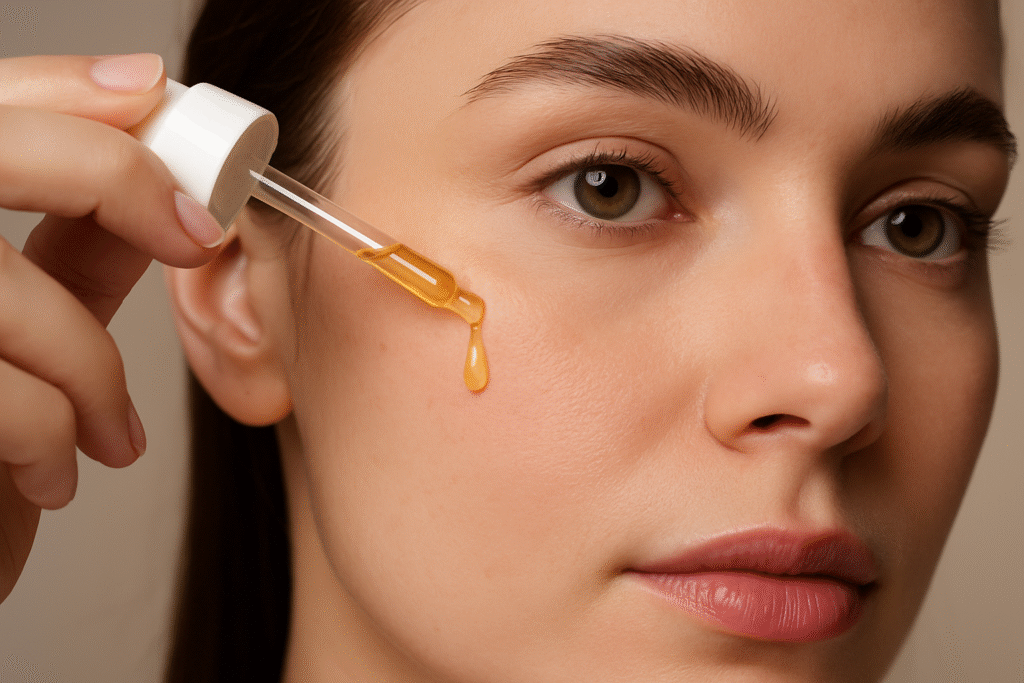What is retinol actually?
Retinol belongs to the family of Vitamin A derivatives - More precisely, it is the pure form of vitamin A. It is one of the best-researched active ingredients in modern skin care. Nevertheless, it still commands a certain amount of respect: too strong, too irritating, only for problematic skin?
Retinol can much morethan he is often given credit for.
Retinol effect on the skin: What is scientifically proven?
1. Visibly reduce wrinkles and fine lines
Retinol stimulates the Collagen production in the skin - a decisive factor when it comes to smoothing fine lines and wrinkles. Studies show: After just a few weeks of regular use, the skin can firmer and smoother have an effect.
2. Refine pores and improve skin texture
Many people report that their pores shrink and their skin appears more even. This is due to the fact that retinol Cell renewal process acceleratedwhich removes dead skin cells faster and keeps the pores clear.
3. Even out pigmentation spots & sun damage
Whether Age spots, hyperpigmentation or slight sun damage - retinol can help to renew the skin and gradually reduce discolouration.
4. Regulate blemished skin
Retinol works keratolytic - it loosens cornifications. This reduces blackheads, clogged pores and impurities. At the same time it works anti-inflammatorywhich is particularly beneficial for hormonal acne.
Retinol vs. other anti-ageing ingredients
| Active ingredient | Effect on wrinkles | Improving the complexion | Compatibility |
|---|---|---|---|
| Retinol | ⭐⭐⭐⭐⭐ | ⭐⭐⭐⭐ | Medium |
| Bakuchiol | ⭐⭐⭐ | ⭐⭐⭐ | High |
| Vitamin C | ⭐⭐⭐⭐ | ⭐⭐⭐⭐ | Medium |
| Peptides | ⭐⭐⭐⭐ | ⭐⭐⭐⭐ | High |
When will we see the first results?
Many users already report after 4 to 6 weeks smoother skin. Deeper changes - such as a reduction in wrinkles or lightening of pigmentation spots - often only become apparent after the treatment. 8-12 weeks.
💡 Important: Retinol works Long-term and cumulative. Continuity beats quick fixes.
How to use retinol correctly
1. Start slowly
Start with a low concentration (e.g. 0.1-0.3 %) - twice a week is sufficient to begin with.
2. Apply in the evening
Retinol makes the skin more sensitive to light. Therefore always apply in the evening - after cleansing, before moisturising.
3. During the day: Sun protection is mandatory
During the day, be sure to use a broad-spectrum sun protection factor (SPF 30 or higher)to protect the skin.
4. Combine with moisture
Tolerance increases when retinol is combined with moisturising active ingredients such as Hyaluronic acid, panthenol or ceramides is combined.
Retinol: what you should avoid
- Do not combine with AHA/BHA on the same eveningas this can irritate the skin too much
- Do not use if the skin barrier is severely damaged (regenerate first!)
- Avoid during pregnancyas vitamin A derivatives are contraindicated in high doses
Conclusion: Retinol is (rightly) a classic
The Retinol effect on the skin is not hype, but scientifically sound. Those who use the active ingredient wisely will benefit in the long term from smoother, more radiant and resilient skin.
Retinol is not a magic formula - but it is one of the best tools we have in modern skincare.
